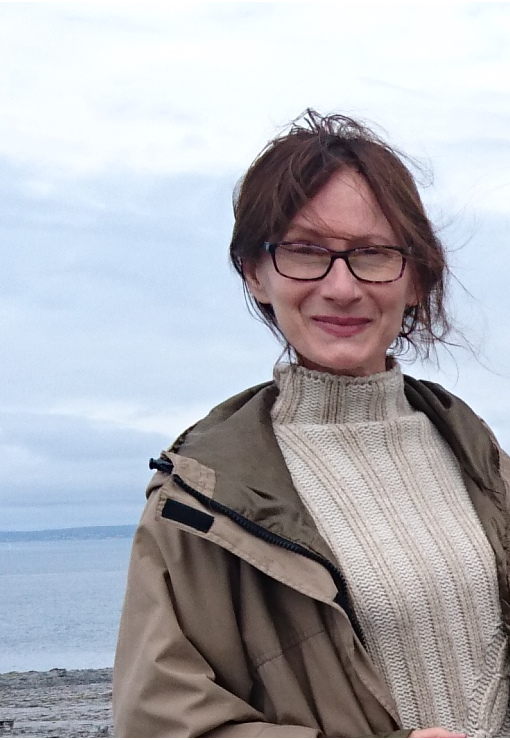
prof. dr hab. Anna Budziak
| Department | Department of English and Comparative Linguistics |
| anna.budziak@uwr.edu.pl |
Research interests and teaching
My interests are in the fields of late Victorian literature and culture, British decadent aestheticism, especially Walter Pater and Oscar Wilde, and modernism, especially T. S. Eliot. I am interested in how literary works retain their relevance beyond their purely aesthetic value and in how they engage with philosophical, theological, and political debates, the interest reflected, for instance, in the question of how Eliot viewed populism. My research interests are also reflected in the courses I teach at the undergraduate and graduate levels, including those on literature and the philosophy of friendship, on literature and the visual arts, on parody, and modern literary theories. I co-edited a collection of philosophical-literary essays Literature, Performance, and Somaesthetics (CSP, 2017) and authored three monographs. My book Text, Body and Indeterminacy: Doppelgänger Selves in Pater and Wilde (CSP, 2008) was shortlisted for the European Society for the Study of English (ESSE) Book Award in 2010 and is listed amidst „Major Books on Pater in English” by Walter Pater Society https://walterpater.com/bibliography/monographs/.
Other information
I graduated from the University of Wroclaw, where I also received an M.A. and a doctoral degree in Literature Studies, and where I was awarded a habilitation. I participated in literature-teaching courses—„The Penn-Leuven Institute for Literary and Cultural Studies” (KU Leuven, Belgia) and “Teaching Literature Overseas” (Corpus Christi, Oxford)—as well as in teaching exchange at the Ruhr-Universität (Bochum, Germany). I also benefited from the British Council funding as a visiting researcher at the University of Warwick (UK) and as a visiting scholar at the University of Ulster. At my home university, I was a research advisor for the Doctoral Student Group (Literary Intersections, 2012-14), head of the 19-20th Century English Literature Centre (2009-17), and acting head of the Department of English Literature and Comparative Studies at the Institute of English Studies (02.2017-09. 2018). I received, on two occasions, the Chancellor’s Award. I am Fellow of the English Association, elected 2005, currently participating in the work of the Fellowship Committee. In 2023, I was selected for Liverpool University Press’ 2023 Awards for Outstanding Journal Reviewers.
Publications
Monographs
T. S. Eliot’s Ariel Poems: Making Sense of the Times, New York and London: Routledge, 2022. https://www.routledge.com/T-S-Eliots-Ariel-Poems-Making-Sense-of-the-Times/Budziak/p/book/9780367645311
Text, Body and Indeterminacy: Doppelgänger Selves in Pater and Wilde. Newcastle: Cambridge Scholars Publishing, 2008. https://cambridgescholars.com/product/978-1-84718-507-5/
Czas i historia u T. S. Eliota. Konteksty filozoficzne. [Time and history in T. S. Eliot]. Wrocław: Wydawnictwo Uniwersytetu Wrocławskiego, 2002.
An edited monograph
Literature, Performance, and Somaesthetics: Studies in Agency and Embodiment. Eds. Anna Budziak, Katarzyna Lisowska i Jarosław Woźniak. Newcastle: Cambridge Scholars, 2017.
Articles
“T.S. Eliot and Populism.” Forum: The Eliot We Need. The T. S. Eliot Studies Annual 7. 1 (2025): 125-137. https://doi.org/10.3828/tsesa.2025.vol7.08
„T. S. Eliot’s Utopian Europe and the Ideal of Empire.” Studia Anglica Posnaniensia: An International Review of English Studies.” Forthcoming.
“Restoring the Self through Writing.”Symposium dedicated to Richard Shusterman’s Philosophy and the Art of Writing. Meta: Research in Hermeneutics, Phenomenology, and Practical Philosophy 16.1 (2024): 284-88.
“Walter Pater’s ‘A Prince of Court Painters’: A Covert Autobiography and Museum Trips”, Connotations: A Journal for Critical Debate (October 2022). https://www.connotations.de/2022/10/01/october-2022-walter-paters-a-prince-of-court-painters-a-covert-autobiography-and-museum-trips/
“On the Parenthesis in T. S. Eliot’s The Cultivation of Christmas Trees.” Essays in Criticism (Oxford Journals) vol. 71, no. 1, Jan. 2021, pp. 46- 65. https://doi.org/10.1093/escrit/cgaa029
“T.S. Eliot’s Anti-Elitist View of Education.” Academic Journal of Modern Philology, vol. 10 (2020), pp. 56-64. https://ajmp.uni.wroc.pl/upload/volume-10/Budziak.pdf
“Modernism and Muddle: Religious Implications of T. S. Eliot’s Use of the Term.” Eds. Adrian Paterson and Christine Reynier, Modernist Writers’ Non-fictional Narratives of Modernism, special issue of E-rea 15. 2 (2018). https://journals.openedition.org/erea
“From T. S. Eliot to Oscar Wilde: Aesthetic Borrowings, Ethical Theft, and Redemption.” English: Journal of the English Association (Oxford Journals) 65.249 (2016): 140-157. https://doi.org/10.1093/english/efw013
“Wyobcowanie rozumu. Postać ,szalonego naukowca’ na tle dziewiętnastowiecznych teorii choroby umysłowej.” [The mad scienetist and the late-nineteenth-century concepts of madness]. Ethos Kwartalnik Instytutu Jana Pawła II 110 (2015): 185-206. Doi: 10.12887/28-2015-2-110-12
“Oscar Wilde’s Renaissance References: Neo-Platonism, Hermeticism, and Mannerism.” Anglica Wratislaviensia 53 (2015): 25-34.
“Parodic and Post-classic: British Decadent Aestheticism Re-approached.” Anglica: An International Journal of English Studies 23.1 (2014): 83-95.
“T. S. Eliot’s ‘La Figlia Che Piange’ and the Tradition of Decadent Aestheticism.” Brno Studies in English 40.1 (2014): 27-45. Doi: 10.5817/BSE2014-2-2
“Przyjaźń zaprzeczona, przyjaźń niespełniona. Portret Doriana Graya Oscara Wilde’a i Droga do Indii Edwarda M. Forstera”. [Friendship in Oscar Wilde’s The Picture of Dorian Gray and E. M. Foster’s A Passage to India] Ethos 3: Kwartalnik Instytutu Jana Pawła II (2013): 121-137.
“Literature in Walter Pater’s Architectural Analogy.” Brno Studies in English 39.1 (2013): 183-198. Doi: 10.5817/bse2013-1-10
“The Setting Sun of British Decadence: Material and Formal Aspects of the Term.” Anglica Wratislaviensia 50 (2012): 23-35.
“O somatycznym uwarunkowaniu stylu i o biologicznej naturze języka. Na przykładach dziewiętnastowiecznej literatury angielskiej.” [On the somatic aspect of style and biological nature of language]. Rozprawy Naukowe 36 (2012): 5-10.
“T. S. Eliot’s Debt to Oscar Wilde: The Paradox of (Im)personality.” Anglica Wratislaviensia 49 (2011): 19-28.
“Of Mirrors and Multiversity, Doppelgängers and Doppelgängerins.” The European English Messenger 20.2 (2011): 47-53. https://essenglish.org/messenger/wp-content/uploads/sites/2/2016/01/202-47-70.pdf
“Theorizing the Self: From the Narrative to the Bodily.” Subject Matters: Journal of Communications and the Self 4.2/ 5.1 (2008): 1-15.
“Between Metaphysics and Physics: Aristotelian and Postmodernist Perspectives in T. S. Eliot’s Theory of Poetic Expression, the Mind, and the Soul.” Anglica Wratislaviensia 45 (2008): 9-22.
“Anty-esencjalizm nietekstowy. O filozofii Richarda Shustermana.” [The non-textual anti-essentialism: On Richard Shusterman’s philosophy]. Er(r)go: Teoria-Literatura-Kultura 12 (2007): 9-24.
“Oscar Wilde’s Refutation of ‘Depth’ in The Picture of Dorian Gray: A Reading.” Brno Studies in English 30 (2004): 135-146.
“Vagaries of the Rose: Allegory of History in Four Quartets.” Anglica Wratislaviensia 39 (2002): 7-20.
“Eliot’s Dreamer and Herbert’s Skeptic: Ethical Implications of the Modernist Personae.” Acta Neophilologica 3 (2001): 143-153.
“Sublimity and Estrangement in E. M. Forster’s ‘The Story of the Siren’.” Lo Straniero: Journal of IMISE (2001): 20-23.
“Ezra Pound and T. S. Eliot: Turning Aesthetics into Political Ethics.” Anglica Wratislaviensia 37 (2001): 7-16.
“Self-Erasure in the Language of Paradox: T. S. Eliot’s Venture Beyond the Confines of Speech.” Anglica Wratislaviensia 36 (2001): 7-20.
“Ideological Vulnerability of Imagery: T. S. Eliot’s Jewish Representations. Anglica Wratislaviensia 27 (1999): 27-40.
“Manifestations of the Cyclical Time Concept in T. S. Eliot’s Early Poetry.” Anglica Wratislaviensia 21 (1991): 87-97.
“Magical Attitudes in T. S. Eliot’s Early Poetry.” Anglica Wratislaviensia 21 (1991): 71-85.
Chapters in print
“The Epigraph for T. S. Eliot’s Marina: Classical Tradition and the Modern Era.” Studying English Literature in Context: Critical Readings, ed. Paul Poplawski, Cambridge: Cambridge University Press, 2022, pp. 372-88. https://doi.org/10.1017/9781108782999
Introduction. Literature, Performance, and Somaesthetics: Studies in Agency and Embodiment, eds. Anna Budziak, Katarzyna Lisowska, Jarosław Woźniak. Newcastle: Cambridge Scholars, 2017, pp. 1-17.
“Genius and Madness Mirrored: Rossetti’s and Yeats’ Reception of William Blake.” Crossroads in Literature and Culture, eds., J. Fabiszak, E. Urbaniak-Rybicka, B. Wolski. Springer-Verlag Berlin, Heidelberg, 2013, pp. 281-192.
“The Idea of Emotion in T. S. Eliot and in Richard Shusterman.” Shusterman’s Pragmatism: Between Literature and Somaesthetics, eds. Dorota Koczanowicz i Wojciech Małecki. Amsterdam: Rodopi, 2012, pp. 33-49.
“The Contradictory Flâneur: Lost in the City and Found in the Text.” Alternate Life-Worlds in Literary Fiction, eds. Ewa Kębłowska -Ławniczak, Zdzisław Wąsik, Teresa Bruś. Wrocław: Wydawnictwo Wyższej Szkoły Filologicznej we Wrocławiu, 2011, pp. 33-43.
“Walter Pater and T. S. Eliot: The Case of Aestheticizing Ethics.” PASE Studies in Literature and Culture, eds. Magdalena Cieślak and Agnieszka Rasmus. Łódź: Wydawnictwo Uniwersytetu Łódzkiego, 2008, pp. 77–85.
Reviews
“A Game of Equivocations: Richard Shusterman’s The Man in Gold: Paths between Art and Life. A Philosophical Tale.” Anglica Wratislaviensia 60 (2022): 285-294.
„Ukryty, jawny, zdystansowany: Richarda Shustermana The Adventures of the Man in Gold: Paths Between Art and Life. A Philosophical Tale.” Er(r)go. Teoria – Literatura – Kultura vol. 41, no. 2 (2020): 203-15.
https://www.journals.us.edu.pl/index.php/ERRGO/article/view/7417
“Conversing with the Ancients.” Review of Oscar Wilde and Classical Antiquity, eds. Kathleen Riley, Alastair J.L. Blanshard, Iarla Manny, OUP. Eos: Commentarii Societatis Philologiae Polonorum 105 (2018):136-144. http://ptf.edu.pl/wp-content/uploads/2019/06/136_2018_eos_fasc.I_EOS-2018-1d.pdf
“W stronę cielesności. Estetyka Richarda Shustermana.” [On Richard Shusterman’s somaesthetics]. Review of Richard Shusterman’s Praktyka filozofii, filozofia praktyki. Pragmatyzm a życie filozoficzne. Trans. A. Mitek, Kraków 2005. Teksty Drugie 3 (2006): 71-75. http://rcin.org.pl/Content/51626/WA248_67881_P-I-2524_budziak-w-strone.pdf
